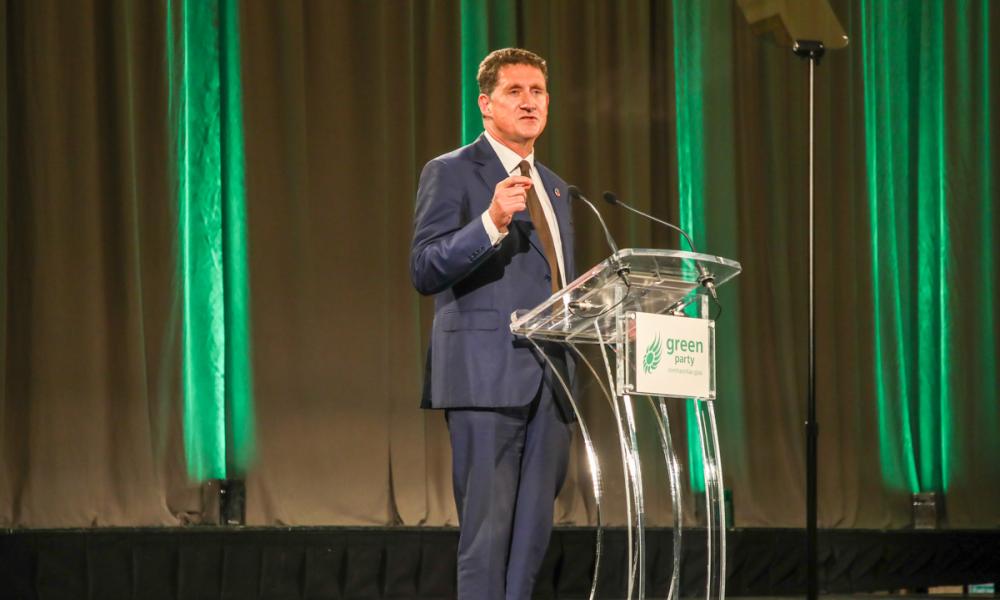Putting Climate at the Heart of Finance - It’s all to play for here at COP28

We are one week into negotiations here at COP28, the UN Climate Conference.
This COP has started relatively well. We had agreement on loss and damage funding on Day 1, an issue which was driven by Ireland over the past year. We also had early agreement on the COP agenda. Up to now discussions have been led by officials and scientists, including our own excellent Team Ireland which has been critically engaged as part of the EU negotiating team.
As we face into the weekend, the negotiations are now moving from the policy and technical phase into the political phase. This is when the rubber hits the road, when options agreed by officials are debated, advocated, negotiated and eventually agreed hopefully by consensus by politicians representing over 190 countries and states.
Coming to decisions by consensus with such huge number is no easy feat but I think it’s all to play for as we head into these political talks. There is momentum building around defining issues – the need to phase out fossil fuel, the aim to triple renewables and double energy efficiency, and the absolute imperative to stick to our North Star goal to maintain global temperature increases to 1.5 degrees Celsius, as agreed in Paris in 2015.
Follow the money
If we want to achieve what we absolutely must for the future of our environment and humanity, we have to follow the money. We need to rapidly get to the point where climate is at the centre of all financial and economic decisions and international financial flows are consistent with keeping global temperatures well below devastating tipping points.
I have just been appointed by the EU Presidency, which rests with Spain at the moment, to be one of the lead negotiators on climate finance at this COP, along with my French counterpart, Agnes Pannier Runnacher, Minister for Energy. Our Irish officials will also be heavily engaged in upcoming negotiations, putting Ireland at the heart of what I believe is the most critical issue at this Conference of the Parties again.
Phase Out of Fossil Fuels
It’s critical because it is what will help us phase out fossil fuels more than anything else so that we can keep the goal of 1.5 alive. Phasing out fossil fuels won’t happen overnight but to ensure that it does happen as quickly as possible, we must have a meaningful alternative so that countries that are currently reliant on polluting fuels can switch easily and faster to clean, renewable energy systems.
To make this work we will need a radical and fair reform of global financial systems, switching investment flows from fossil fuel into the clean energy sector. In essence, this means that it must become much cheaper and more attractive to invest in renewables, particularly for developing countries, and much more expensive and less attractive to invest in fossil fuel development and exploration. We need to get to the $4.5 Trillion goal that the International Energy Agency calculates we will need to spend on renewables every year by 2030.
We will need to create new, wrap-around, blended finance systems that combine both public and private investment aimed at reducing risk and incentivising investment in developing markets particularly. At the moment the Netherlands, which is one of the smallest countries in Europe, has more solar panels than the entirety of Africa which has 60% of the world’s solar radiation. This has to change.
However, the reality is that the massive scale of the funding that we now need for climate mitigation and adaptation cannot be met from exchequer funding only. Therefore, we will have to think bigger, be more dynamic, and to look at more innovative sources of funding, including contributions and investments from the sectors like the fossil fuel industry or like aviation or maritime.
Just Transition
Above all we have to stitch climate justice into everything we do. We are falling way behind in our efforts to lift people out of extreme poverty. World levels of hunger are back to where they were in 2005. Some 15% of countries are currently in debt default and 45% are at risk of becoming so.
This disproportional disadvantage has very practical and devastating manifestations. One of the events which I attended earlier this week at COP28 was a clean cooking alliance event which highlighted that over 1 billion people in Africa and 3 billion across the world– mostly women and girls – still lack clean cooking facilities. It’s scandalous that up to 4 million a people a year – again mostly women and children – are dying because of unhealthy and dangerous open fire cooking fuels.
It doesn’t have to be this way.
We can send out a strong agreed signal here in Dubai that we can deliver at COP in Brazil next year. This is what we did last year when Ireland led negotiations on loss and damage. We came to an agreement on the dedicated fund for vulnerable countries and then set up a global group to work on it over the intervening year, to deliver it here in Dubai.
The coming days will be frenetic. It will mean early mornings and late nights, all-nighters even as we approach the deadline of next Tuesday, December 12th. But Team Ireland will stay the course, working hard to ensure that we can change and phase out fossil fuels by changing the global finance system that has locked us into climate breakdown, inequality and insecurity for far too long.



